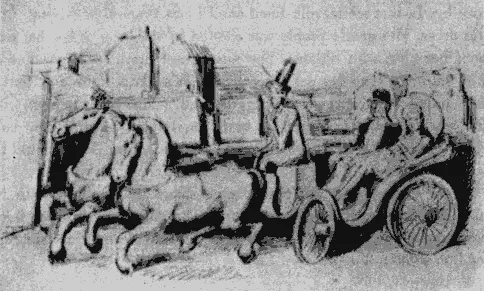Under his black bowler hat a grim, gray face with sideburns was visible. I shivered when I saw him. There could be no doubt. This was M. de V. . . .
As the elegant carriage passed me, discreetly rumbling with its well-sprung box, Bianca said something to her father, who turned back and stared at me through his large dark glasses. He had the face of a gray lion without a mane.
Excited, almost demented from contradictory feelings, I cried out: "Count on me!" and "until the last drop of my blood ..." and fired into the air a pistol produced from my breastpocket.
XXIX
Many things seem to point to the fact that Franz Joseph was in reality a powerful but sad demiurge. His narrow eyes, dull like buttons embedded in triangular deltas of wrinkles, were not human eyes. His face, with its milky white sideburns brushed back like those of Japanese demons, was the face of an old mopish fox. Seen from a distance, from the height of the terrace at Schönbrunn, that face, owing to a certain combination of wrinkles, seemed to smile. From nearby that smile unmasked itself as a grimace of bitterness and prosaic matter-of-factness, unrelieved by the spark of any idea. At the very moment when he appeared on the world stage in a general's green plumes, slightly hunched and saluting, his blue coat reaching to the ground, the world reached a happy point in its development. All the set forms, having exhausted their content in endless metamorphoses, hung loosely upon things, half wilted, ready to flake off. The world was a chrysalis about to change violently, to disclose young, new, unheard-of colors and to stretch happily all its sinews and joints. It was touch and go, and the map of the world, that patchwork blanket, might float in the air, swelling like a sail. Franz Joseph took this as a personal insult. His element was a world held by the rules of prose, by the pragmatism of boredom. The atmosphere of chanceries and police stations was the air he breathed. And, a strange thing, this dried-up dull old man, with nothing attractive in his person, succeeded in pulling a great part of creation to his side. All the loyal and provident fathers of families felt threatened along with him and breathed with relief when this powerful demon laid his weight upon everything and checked the world's aspirations. Franz Joseph squared the world like paper, regulated its course with the help of patents, held it within procedural bounds, and insured it against derailment into things unforeseen, adventurous, or simply unpredictable.

Franz Joseph was not an enemy of godly and decent pleasures. It was he who invented, under the spur of kindliness of a sort, the imperial-and-royal lottery for the people, Egyptian dream books, illustrated calendars, and the imperial-and-royal tobacco shops. He standardized the servants of heaven, dressed them in symbolic blue uniforms, and let them loose upon the world, divided into ranks and divisions—angelic hordes in the shape of postmen, conductors, and tax collectors. The meanest of those heavenly messengers wore on his face a reflection of age-old wisdom borrowed from his Creator and a jovial, gracious smile framed by sideburns, even if his feet, as a result of his considerable earthly wanderings, reeked of sweat.
But has anyone ever heard of a frustrated conspiracy at the foot of the throne, of a great palace revolution nipped in the bud at the beginning of the glorious rule of the AU-Powerful? Thrones wilt when they are not fed with blood, their vitality grows with the mass of wrongs committed, with life-denials, with the crushing of all that is perpetually different and that has been ousted by them. We are disclosing here secret and forbidden things; we are touching upon state secrets hidden away and secured with a thousand seals of silence.
Demiurge had a younger brother of an entirely different cast of mind, with different ideas. Who hasn't a brother under one form or another who follows him like a shadow, an antithesis, the partner in an eternal dialogue? According to one version, he was only a cousin; according to another, he had never been born. He was only suggested by the fears and ravings of the Demiurge, overheard while he was asleep. Perhaps he had only invented him anyway, substituted someone else for him, in order to play out the symbolic drama, to repeat once more, for the thousandth time, ceremoniously and ritually that prelegal and fatal act that, in spite of the thousand repetitions, occurs again and again.
1 comment